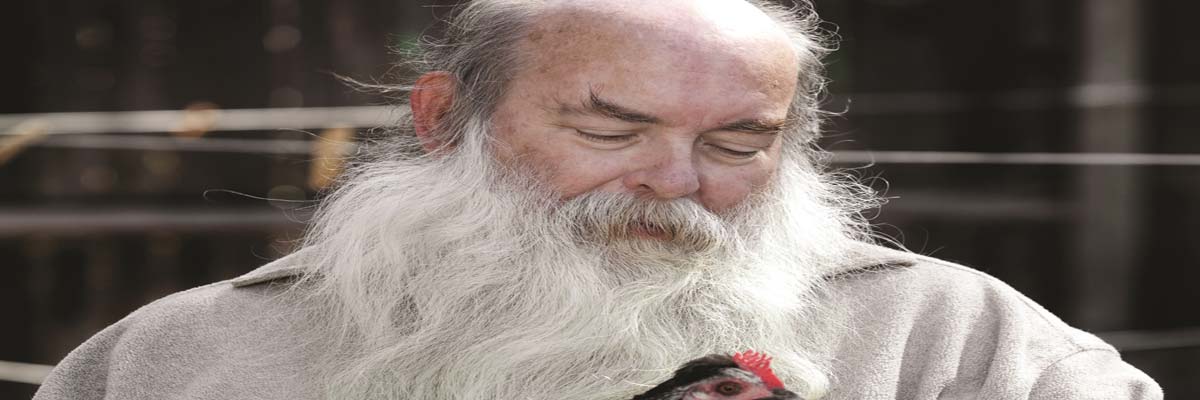An Interview With Bob Waldrop
This spring I had the pleasure of talking with Bob Waldrop as part of a series of interviews done for the forthcoming book A Nation of Farmers. Bob is a native, 4th generation Oklahoman, who was born and raised in Tillman County in southwest Oklahoma. His great-grandparents came to Oklahoma Territory before statehood. He is the founder of the Oscar Romero Catholic Worker House (which delivers food to people in need who don’t have transportation), the president of the Oklahoma Food Cooperative, and works as director of music at Epiphany of the Lord Catholic Church. He served on the founding board of directors of the Oklahoma Sustainability Network, and previously served on the Migrants and Refugees Advisory Committee of Catholic Charities. He is the editor of Better Times: An Almanac of Useful Information, which is distributed free. The 5th edition may be viewed at www.bettertimesinfo.org/2004index.htm. He is a member of the Oklahoma Food Policy Council. Although not presently active in the program, he has served as an Oklahoma County Master Gardener.
A big thank you to Sarah Louise Hartman for transcribing this interview.
Aaron Newton: Bob, could you describe the Oscar Romera Catholic Worker House, and the operations that you’re a part of there in Oklahoma City?
Bob Waldrop: The Catholic Worker movement was founded in 1933 by Dorothy Day and Peter Maurin in New York, and we’re kind of where the anarchists hang out in Catholic church. Every time I say this, people laugh and say that’s an oxymoron — you can’t be an anarchist and be a Catholic at the same time. Well, we’ve managed for 75 years, and each Catholic Worker community is autonomous, we don’t have a central hierarchy, and we believe in living in solidarity with the poor, in voluntary poverty, and in doing what the Catholics call the works of mercy, justice, and peace. we concentrate on food security — and so we not only hand out food or give homeless people housing or whatever like that, we also ask questions about why these people are hungry, why are they homeless, why there are these inequities of wealth and access to resources, and then we work to build a better society where those inequities no longer exist. Dorothy Day said that part of our job was to make a world where it is easier for people to be good. And so that governs a lot of things that we do.
AN: What do the operations actually look like?
BW: We do about, oh, 3600-4000 deliveries every year to over 8 or 9 thousand people who live in those houses. And we get food for that from the Regional Food Bank of Oklahoma and also people donate food. Members of the food co-op donate money that I use to buy food from the farmers to give to the poor.
AN: Is it correct to characterize your work with local food as social justice work?
BW: Well, that’s true. During a lot of my life I’ve just been really poor, and so there was a time in my life where the only reason that I had bread was that I had wheat and I had a grinder and I was able to grind my own flour to make bread. And the only reason that I had tomatoes is because I had tomato plants in my yard. And the only way that I had a meal at all was that I was willing to cook meals from basic ingredients. So I actually come at this not from a position of affluence, but from a place of experience with scarcity and having to figure out how to feed eight people with a quarter pound of sausage and a cup of milk.
AN: As the cost of food is rising in this country we’re hearing that people making poor nutritional choices. The idea being that if they can’t afford to buy better food, fresh food, or organic food and that they’re forced to buy processed foods- that they’re basically eating ramen noodles every evening for dinner. Are you saying that they can have nutritionally adequate diets?
BW: Well, you can take ramen noodles and you can make something better, more healthy out of them also. I’ve eaten a lot of ramen noodles in my day and ramen noodles are actually kind of an interesting substrate for many different kinds of stirfries. People aren’t changing their food choices so that they’re buying, say, pork neckbones and whole wheat flour- or even white flour for that matter- they’re just buying the cheaper processed foods, the corn dogs and the cheap pizzas and hot dogs and mystery meats like that.
There’s been an almost complete loss of cultural information from generation to generation in a lot of poverty communities. A lot of strategies of their parents and grandparents, the younger generation simply isn’t aware of. Just one example is lamb’s quarters. It grows pretty prolifically in every poor neighborhood on the street and very few people pick them and eat them. And they’re very tasty — I call them Oklahoma spinach. They’re very tasty and a good source of vitamin C and other things that you get in green vegetables, but people just don’t recognize that as food, they think of it as a weed, and so they don’t take advantage of the fact that they can get it for free, basically, just by picking it.
AN: How does the lack of transportation affect people’s access to food?
BW: Well, that’s a very significant thing. Someone asked me one time why all these little convenience stores all over the place, besides the typical convenience store things that you think of like cigarettes and beer and candy and soda pop also sold the basic selection of basic groceries, canned foods, things like that. I said, the reason for that is that some people don’t have transportation and they just can’t get to a supermarket and that’s where they do their grocery shopping. And they were just horrified by that thought because it’s very expensive and the selection isn’t very much. And part of the reason is that Oklahoma City has very poor public transportation, so people without cars aren’t able to access larger stores. One thing that I have noticed happening however in the lower income neighborhoods that are mostly African-American is that there is a whole group of vegetable tenders that buy from rural farmers and then bring produce to street corners in low-income neighborhoods.
AN: And that’s happening now?
BW: That’s happening now. And that’s really kind of just under the radar. I only found out about it because we’re over there delivering food a lot and one summer I noticed the same guy in different places with a six-by-twelve flatbed trailer, and he would one day have watermelons, and one day have cantaloupes, and one day have pumpkins, and one day he had it all loaded down with corn, and since I was looking for people who grow food to sell, and I talked to him and said “Where do you get this?” And he said, “Well, I know a few farmers here and there around town, around the outskirts…” And it was around a sixty-mile radius.
And the other interesting thing about it is that what he’s doing is illegal in Oklahoma City because he doesn’t have a license. And a license is kind of expensive, I think 50 dollars a month or something like that, which is a lot for a small marginal business like that.
In many areas it is illegal to grow vegetables in the city for sale at all. And I know people who were supplementing their retirement income by growing tomatoes in their backyard and selling them out of their front yard, and they were closed down. Because it is ok to have a vegetable garden, but it’s not ok to grow it and then sell.
Another thing that they need to do is that right now it’s basically illegal to prepare any food that you’re going to sell to the public in your home kitchen, even if your home kitchen meets government commercial kitchen standards. And that’s something that should be changed. Maybe not for everything, but for many things: jams and jellies, pickles and things like that that are loaded with vinegar, sauerkraut, things like that.
AN: Are you aware of any community kitchen efforts that try to address the problem of not having an approved kitchen in which to create some of these down-home recipes and sell them?
BW: Well, there’s some of that going on- starting to pop up down there. And that’s one thing that governments could do to help, — call it an incubator kitchen or something like that — and they could build those kind of facilities with community block grant money, and make it available to food entrepreneurs. They give giant corporations millions of dollars t0 come here and open up a place that would hire 300 people. For $100,000 they could build a nice commercial kitchen incubator facility.
AN: How much of what you’re doing do you think is replicable throughout the United States and how much contact do you have with other people working on similar projects?
BW: I think it’s totally replicable. We’ve helped start- we call ourselves the Oklahoma Plan Cooperative- and there’s Oklahoma Plan Cooperatives operating now in Nebraska, Idaho, Michigan, Texas, Kansas, and I just got back yesterday from Ontario. I gave a presentation at a state community college in Ohio, close to Toledo, to a group of about 100 people who are thinking of doing this. And we’re having a group coming from Ontario this week to our delivery day, They want to start the Niagara Food Cooperative up there in Canada. So these are all kind of just the beginning. We help them, all of them send at least one person to one of our delivery days to see how we do things, we give them our software that we developed for our co-op free of charge. There’s organizing campaigns going on in Colorado, in Iowa, and then two different ones going on in Ontario.
AN: I understand you cook outdoors in the summer.
BW: Yes, In the summer we cook all meals outside. The moment it starts getting hot in late May, early June I set up an outdoor kitchen on my front porch where it’s shady. I see these adds and look in stores where they’re talking about this 25,000 dollar outdoor kitchen and mine is a propane grill and an electric frying pan, we have a two-burner propane camp stove, and I have a little roller table. I do all my food prep inside, load up the roller table, roll it out on the front porch and cook everything. All that heat and humidity in the summer ends up outside instead of in the house. I got that idea from my grandmother. I asked her — I said, “What did you guys do before you had air conditioning in the summers?” She said that they cooked outside and they nearly always slept outside also. We haven’t slept outside yet but I keep thinking about putting screen around my front porch and do some of that sleeping outside someday.
AN: What sort of plants do you have growing at your house?
BW: Well, we grow over 100 different types of plants in our former lawn and two thirds of those are perennials. We have peach trees and apple trees and elderberries. Boysenberries, blackberries, dewberries, raspberries, blueberries, mulberries. We have plums, we have apricots, we have a persimmon tree that hasn’t grown anything yet. We have bush cherries, we have clove currants and sand cherries, we have a Siberian pea shrub, we have Nanking cherries, we have chokecherries, and we usually have several varieties of each of these. We have roses, which we grow for the rose hips, and also the rose petals are edible. We have comfrey which is medicinal and we have prickly pear cactus which is edible. For annuals, we tend to concentrate on things that we can’t get easily from other local sources or organic sources, or where we want a lot of something, more than we want to spend money on. So we grow a lot of paste tomatoes because I like to make my own tomato sauce. we grow a lot of alliums, we grow multiplying onions and shallots and various kinds of chives and garlic and we grow cooking greens like chard and collards. Actually, this year we aren’t growing any collard greens, we’re growing mostly chard. And then I grow a few a few carrots and potatoes, but we don’t have enough room to grow a lot of those. This year I’m going to experiment with some container growing. I’ve tried growing potatoes in a bucket. we grow hot peppers. We grow a lot of haberneros, sachwanas, cayennes, and jalepenos.
AN: From a big picture perspective, Bob, what concerns you most going forward about the future of food or in a more general sense the future of human existence going into the 21st century? Is there a particular problem that most concerns you?
BW: Well, I just think we’re coming to a perfect storm with the whole peak oil, the climate change, and general ecological devastation. And I think we’re more dependent than we’ve ever been on highly centralized systems of distribution, just-in-time inventory systems.That’s all just a lot weaker than most people think, and it puts us truly at risk. I think we also have lost a lot of cultural information. My grandfather used to be known throughout his county for the ability to cure hams and make sausage. But those recipes — he didn’t teach his father how to do that, and my father didn’t teach me, and so those are all lost.And my dad remembers that it was very good, he said it was the best tasting sausage that he’d ever had. But the recipe was never written down it was just in his head, and so it was just lost.






